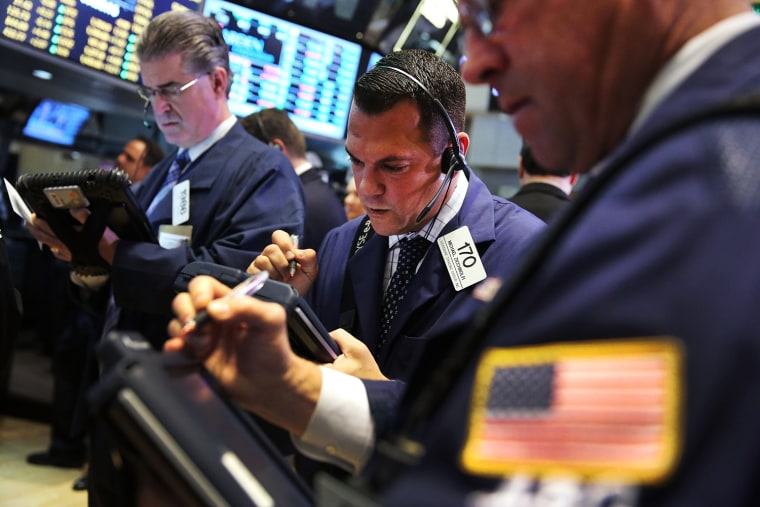Let Washington worry about the details and the political intrigue. If you want to know how the debt ceiling drama is going to end, watch Wall Street — and Wall Street seems to think it’s a done deal.
The stock market staged a robust rally Wednesday, even after a credit rating agency threatened to downgrade the United States for inching too close to a default on its bond payments. The Dow Jones industrial average surged 200 points, and other stock indexes approached record highs.
Investors seemed to be betting that the Senate, where Democrats and Republicans announced a deal to reopen the federal government and extend the country’s ability to borrow money, would carry the day.
Sources told NBC News that John Boehner, the Republican speaker of the House, was prepared to rely on Democratic votes and pass a deal sent over by the other chamber.
“Investors are looking at that and saying: 'We’re not expecting these guys to collectively jump off a cliff. We think this ultimately will be resolved,'” Jack Ablin, chief investment officer of BMO Private Bank, said on CNBC.
Equally optimistic but considerably more colorful language came from the best-known investor in America, Warren Buffett — who said on “Squawk Box” that he did not expect the United States to damage its 237-year reputation for paying the bills. Doing otherwise would be a “pure act of idiocy,” he said.
“Credit-worthiness is like virginity: It can be preserved but not restored very easily, so it is crazy to play around with it,” he said.
The market set aside the apparent chaos among Republicans in the House a day earlier. Conservatives wanted to curtail the health law known as Obamacare, and Boehner failed to rally his members behind any proposal.
The rally in stocks Wednesday was broad — the Standard & Poor’s 500 index, watched more closely than the Dow by market experts, climbed more than 1 percent and was close to an all-time high.
“Investors have generally been of the belief that an agreement would be reached before there was a calamity,” said Dan Greenhaus, chief global strategist for the brokerage BTIG. “If recent reporting is any indication, this subdued concern seems justified as a bill may be signed by Saturday.”
In another sign that investors were drawing optimism from Washington, the market’s so-called fear gauge, the CBOE Volatility Index, fell by 10 percent.
And bond investors — the people most directly affected by the credit of the United States — were hesitant at first, but by afternoon, when the Senate appeared closer to announcing a deal, even they appeared relieved.
Yields on short-term government debt, even Treasury bills coming due a week from now, fell sharply. Yields on bonds fall when investors are more confident that they will get their money back.
If Boehner allows the House to vote on it, and presumably pass it with broad support from Democrats, the Senate plan would avert a potential default on American debt. Economists have warned that such a default would be catastrophic.
The rally in stocks was triggered by a Twitter post by Robert Costa, Washington editor for the National Review and a CNBC contributor, who reported that Boehner would take up the Senate plan and allow it to pass with Democratic votes.
“There’s no way the Senate moves forward unless they have that guarantee from Boehner,” Costa said on CNBC.
A vote could come as early as later Wednesday, he reported.
Related:
Warren Buffett: It would be asinine if US defaults
Senate scrambles to seal risky, last-minute deal
Kelly O’Donnell of NBC News contributed to this report. Alex Crippen and Patti Dom of CNBC also contributed.
